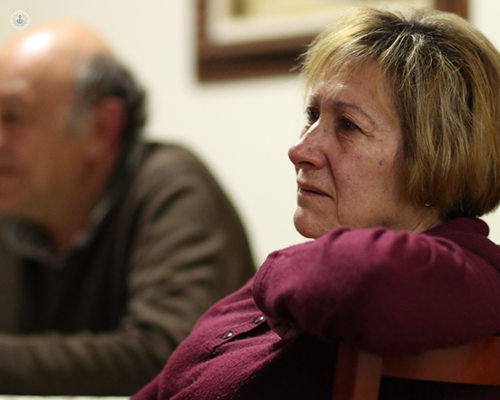Ovarian cancer overview
Autore:
Ovarian cancer is one of the most common types of cancer in women. Furthermore, it presents symptoms that may be misdiagnosed so it’s incredibly important that signs of ovarian cancer are recognised by medical staff in order to ensure patients receive the best care possible.
Top Doctors speaks to leading gynaecology expert Mr Saurabh Phadnis for a detailed take on the condition so people who may be worried about having ovarian cancer can arm themselves with the information they need to know.

What is ovarian cancer?
When abnormal cells from the ovaries, a pair of small organs located low in the stomach, grow in an uncontrolled way. The ovaries are connected to the womb and store a woman’s supply of eggs.
A specific term related to the condition, ´tubo-ovarian cancer´ comes from the belief that most cases of ovarian cancer arise from the fallopian tube.
What are the symptoms?
Using the acronym BEAT, we can help people clearly remember what to look for.
B: Bloating that doesn’t come and go
E: Eating difficulty and feeling full more quickly
A: Abdominal pain and also in the pelvis, that you feel most days
T: Toilet – changes in urination or bowel habits
If you experience any of these symptoms and they are persistent, seek medical help from your GP immediately.
Can it be prevented?
There are no screening programmes for ovarian cancer. 10 to 15 per cent of tubo-ovarian cancer is genetically linked so you may be offered risk reducing surgery if you are found to be carrying a gene that predisposes you to ovarian cancer at an appropriate age.
How common is it?
It’s the sixth most common cancer in women and ovarian cancer diagnoses are made approximately 7,500 times in the UK every year.
What makes someone more at risk of ovarian cancer?
Ovarian cancer occurs more in people of older age. The risk increases if you have any of the following:
- Inherited genes that increase the risk of ovarian cancer include mutations of BRCA1 and BRCA2 (the genes that, if mutated, can increase the likelihood of having cancer).
- A case of breast cancer in the past.
- Using hormone replacement after menopause.
- Smoking, exposure to asbestos and radiation.
- Certain medical conditions such as endometriosis and diabetes have an increased risk, as does being overweight.
If there is a family history of this type of cancer, does this make a person more at risk?
10 to 15 per cent of ovarian cancer is linked to genes. Faults in genes like BRCA1, BRCA2, RAD51C and BRIP-1 are known to be linked with ovarian cancer.
Does advanced stage 3 and 4 ovarian cancers mean there is no cure?
Absolutely not. Statistics show that about 25 per cent of patients with advanced-stage ovarian cancer are cured and with advances in treatment, 35 per cent of patients are living longer than 10 years. It’s been found that in 66 per cent of patients, ovarian cancer comes back within two years.
What is the treatment for ovarian cancer?
Treatment is a combination of surgery and chemotherapy. It’s possible to offer surgery (also called primary cytoreduction surgery) even in advanced stages, to remove all sites of cancer, followed by six cycles of chemotherapy.
The aim of surgery is not to leave any cancer behind that is visible to the naked eye. If primary cytoreduction surgery isn’t possible, then three cycles of chemotherapy are initially given. This is then followed by surgery, or interval cytoreduction surgery, and then another three cycles of chemotherapy.
What is the survival rate of ovarian cancer?
Ovarian cancer survival rate depends of the stage of cancer. More than 75 per cent of women are alive at year one, while the overall survival is 35 per cent at the end of 5 years.
What can a patient expect during a consultation for ovarian cancer treatment?
It will include taking patient’s medical history, examination and relevant investigation, such as an ultrasound scan of the pelvis. Further investigations such as examination under anaesthesia are occasionally necessary for diagnosis or for treatment planning.
If you want expert assistance regarding ovarian cancer, make an appointment with Mr Phadnis at your convenience. Visit his Top Doctors profile for further details.


